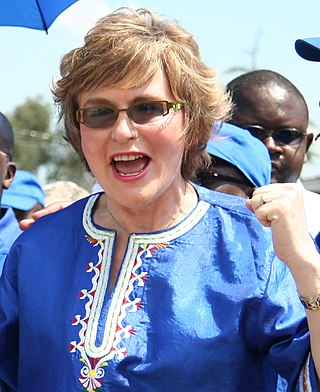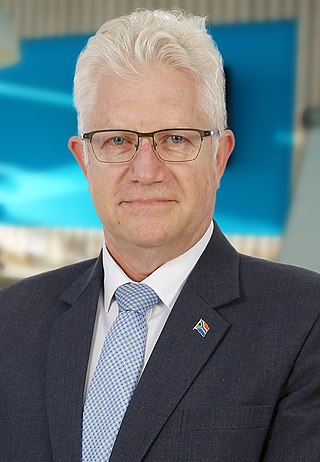
The South African Police Service (SAPS) is the national police force of the Republic of South Africa. Its 1,154 police stations in South Africa are divided according to the provincial borders, and a Provincial Commissioner is appointed in each province. The nine Provincial Commissioners report directly to the National Commissioner. The head office is in the Wachthuis Building in Pretoria.

The Directorate of Special Operations (DSO), commonly known as the Scorpions, was a specialised unit of the National Prosecuting Authority of South Africa formed by President Thabo Mbeki, tasked with investigating and prosecuting high-level and priority crimes including organised crime and corruption. An independent and multidisciplinary unit with a unique methodology which combined investigation, forensic intelligence, and prosecution, the Scorpions were known as an elite unit, and were involved in several extremely high-profile investigations, especially into the Arms Deal and into high-ranking African National Congress (ANC) politicians including Jackie Selebi, Jacob Zuma, and Tony Yengeni.

Khayelitsha is a township in Western Cape, South Africa, on the Cape Flats in the City of Cape Town Metropolitan Municipality. The name is Xhosa for New Home. It is reputed to be one of the largest and fastest-growing townships in South Africa.

Otta Helene Maree, known as Helen Zille, is a South African politician. She has served as the Chairperson of the Federal Council of the Democratic Alliance since 20 October 2019. From 2009 until 2019, she was the Premier of the Western Cape province for two five-year terms, and a member of the Western Cape Provincial Parliament. She served as Federal Leader of the Democratic Alliance from 2007 to 2015 and as Mayor of Cape Town from 2006 to 2009.

Crime in South Africa includes all violent and non-violent crimes that take place in the country of South Africa, or otherwise within its jurisdiction. When compared to other countries South Africa has notably high rates of violent crime and has a reputation for consistently having one of the highest murder rates in the world. The country also experiences high rates of organised crime relative to other countries.
Frank Kennan Dutton SCOB was a South African police officer. The dominant theme in his career was the investigation and prosecution of people guilty of committing war crimes and crimes against humanity during South Africa's apartheid era. Dutton's work took place in South Africa as well as abroad. In South Africa, he helped expose the apartheid military's destabilization machinery, and later headed the Scorpions, the country's elite police force. He also worked with the International Criminal Tribunal for the former Yugoslavia.

Lynne Brown is a South African politician who is a former Minister of Public Enterprises and former Premier of the Western Cape Province. She was born in Cape Town and grew up in Mitchells Plain. She was appointed Premier of the Western Cape following the resignation of Ebrahim Rasool in July 2008. Previously, she was Minister for Economic Development and Tourism. She is a member of the African National Congress (ANC) and an elected member of its National Executive Committee in 2007 and 2012. She is from a coloured background and was the fourth coloured premier of the Western Cape, the second from the ANC, and the first openly gay person to be appointed to a cabinet post in any African government.

Emmanuel Nkosinathi "Nathi" Mthethwa is a South African politician who served as Minister of Sports, Arts and Culture from 2019 until his demotion from cabinet in 2023. He had previously served as the Chief Whip for the African National Congress in the National Assembly in 2008, as Minister for Safety and Security from 2008 to 2014, and as Minister of Arts and Culture from 2014 to 2019. He is from Kwambonambi, KwaZulu-Natal.
Catherine "Kate" O'Regan is a former judge of the Constitutional Court of South Africa. From 2013 to 2014 she was a commissioner of the Khayelitsha Commission and is now the inaugural director of the Bonavero Institute of Human Rights at the University of Oxford.
Vusumzi "Vusi" Pikoli is a South African advocate and the former head of South Africa's National Prosecuting Authority. He is noted for instigating criminal charges against disgraced South African police commissioner Jackie Selebi and ANC president Jacob Zuma. In 2008 he was suspended from his duties by President Thabo Mbeki, a close confidant of Selebi, and then subsequently fired by Mbeki's successor, Kgalema Motlanthe, who is an ally of Zuma. As such, opposition parties and sections of the press have claimed Pikoli is the victim of two separate political conspiracies. In October 2014 Pikoli was appointed as the Western Cape's first police ombudsman by Premier Helen Zille, whose choice was unanimously backed by the provincial legislature's standing committee on community safety.

Dikgang Ernest Moseneke OLG is a South African jurist and former Deputy Chief Justice of South Africa.

Founded in 2008, the Social Justice Coalition (SJC) is a membership-based social movement made up of 12 branches, located mainly in informal settlements across Khayelitsha, Cape Town. Since its formation, the SJC has worked to advance the constitutional rights to life, dignity, equality, freedom and safety for all people, but especially those living in informal settlements across South Africa. Their campaigns are based on ongoing research, education, and advocacy and divided across two programs. The Local Government Program leads the work on sanitation, budgets, and urban land. The Safety and Justice Program is focused on policing and the criminal justice system.

Bonginkosi Success Madikizela is a South African politician.
The Constitution of South Africa protects all basic political freedoms. However, there have been many incidents of political repression, dating back to at least 2002, as well as threats of future repression in violation of this constitution leading some analysts, civil society organisations and popular movements to conclude that there is a new climate of political repression or a decline in political tolerance.

The Marikana massacre was the killing of thirty-four miners by the South African Police Service (SAPS) on 16 August 2012 during a six-week wildcat strike at the Lonmin platinum mine at Marikana near Rustenburg in South Africa's North West province. The massacre constituted the most lethal use of force by South African security forces against civilians since the Soweto uprising in 1976 and has been compared to the 1960 Sharpeville massacre.
Mangwashi Victoria Phiyega, commonly known as Riah Phiyega, was the National Police Commissioner of the South African Police Service. She was appointed to the office by South African President Jacob Zuma on 12 June 2012 and was the first woman to hold the post. Phiyega was suspended on 14 October 2015 by the President following a recommendation of the Farlam Commission of Inquiry into the deaths of protesting miners in Marikana in 2012.
2015 in South Africa saw a number of social and political protests and movements form. At President Jacob Zuma's 2015 State of the Nation Address, the president was interrupted by an opposition party, the Economic Freedom Fighters, who demanded that he pay back the money used on his Nkandla homestead. South Africa also saw new xenophobic uprisings taking place, mainly targeted towards Africans from other countries. Foreigners were beaten, robbed and murdered during the attacks. The social protest Rhodes Must Fall started in 2015 at the University of Cape Town to protest for the removal of statues erected in South Africa during the colonial era depicting some of the well known colonists who settled in South Africa. In education, South Africa recorded a drop in its matric pass rate from 2013 to 2014. The protest #FeesMustFall was started towards the end of the year and achieved its primary goal of stopping an increase in university fees for 2016. South Africa also saw the discovery of Homo naledi in 2015. The South African national rugby union team came third in the 2015 Rugby World Cup and Trevor Noah started hosting The Daily Show on Comedy Central.

Alan Richard Winde is a South African politician and businessman. He is the 8th and current Premier of the Western Cape, having held the position since 2019. He has been a Member of the Western Cape Provincial Parliament since 1999 and belongs to the Democratic Alliance.

The Cape Organisation for the Democratic Taxi Association (Codeta), also sometimes called the Congress of Democratic Taxi Association(s) or Congress for Democratic Taxi Associations, is an umbrella body for minibus taxi operators in the Western Cape province of South Africa. Formed in 1992, it is one of the two major taxi associations in the Western Cape, and has frequently been embroiled in violent conflict with its primary competitor, the Cape Amalgamated Taxi Association (CATA), since the latter broke away from Codeta in the mid-1990s. Codeta, like CATA, is a member of the Western Cape provincial arm of the South African National Taxi Council.















